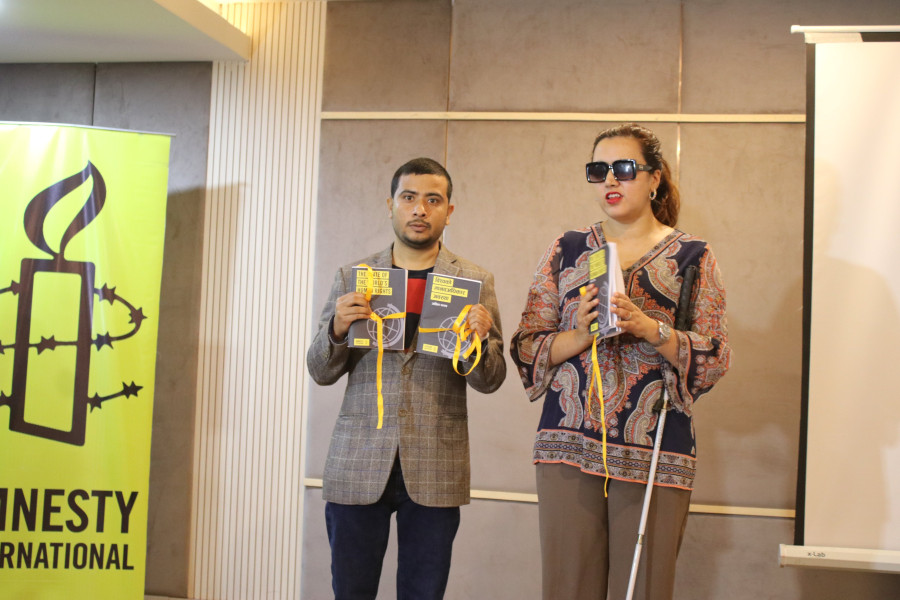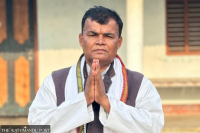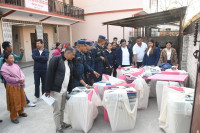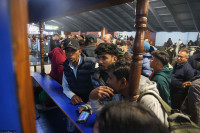National
Amnesty International flags Nepal’s declining human rights amid global trends of repression, impunity
Report calls out government for using excessive force to suppress peaceful protests, citing arbitrary arrests, detentions, and violence.
Post Report
The world is hurtling into a time of human rights regression, Amnesty International warned on Tuesday, with its latest annual report revealing a rise in authoritarian creep, impunity, and systemic abuses across 150 countries, including Nepal.
The watchdog’s 2025 edition of ‘The State of the World’s Human Rights’, released on Tuesday, lays bare the widening assault on freedoms, stoked in part by what it calls the accelerating ‘Trump effect’.
In the preface to the report, Secretary General Agnès Callamard describes Trump’s term as a “multiplicity of assaults—against human rights accountability, against international law, and the UN”.
Nepal emerges in the report as a country where human rights are deteriorating under the pressure of state repression, impunity, and entrenched discrimination. It documents a year marred by violence against protesters, suppression of free speech, impunity for systemic abuses, and continued marginalisation of vulnerable groups like women, LGBTI individuals, Dalits, and squatters.
The report calls out the Nepali government for using excessive force to suppress peaceful protests, citing arbitrary arrests, detentions, and violence. It points to key incidents last year, including the arrest of eight protesters at Maitighar in January, a February crackdown on anti-loan shark demonstrators, and the March detention of 13 people near the Prime Minister’s residence.
In May, 11 students protesting corruption were also detained. Some protests turned deadly, and police shot and killed a demonstrator in Sarlahi on January 5. The report highlights the beating and detention of 20 disability rights activists in May, as documented by the National Human Rights Commission.
Amnesty also warns of a growing crackdown on free speech in Nepal, with increased harassment and arrests of journalists, activists, and online critics.
In fact, Freedom Forum documented 57 cases of threats, intimidation, and gender-based violence against journalists in 2024.
The report references arrests in August of three individuals for anti-government slogans during a festival, and others for Facebook posts critical of former PM Sher Bahadur Deuba, his wife, and Prime Minister KP Sharma Oli. It also notes the February arrest of two journalists in Kanchanpur for reporting on police mismanagement, and the May arrest of Kantipur Media Chairperson Kailash Sirohiya, seen as retaliation for reporting on corruption.
While Amnesty acknowledges some progress in transitional justice, it criticises serious flaws in the government’s approach. In August, a bill was passed to amend the Disappeared Persons Enquiry, Truth and Reconciliation Commission Act, but the report says it contains “accountability gaps”, including weak definitions of crimes and reduced sentences for serious violations.
Violence against women and girls continues across Nepal, the report finds. Despite laws banning child marriage and chhaupadi (banishing menstruating women to huts), harmful practices persist. In June, a 16-year-old girl was raped in a menstrual shed in Achham. In July, a police officer was remanded for repeatedly raping a 10-year-old girl working in his home.
Over 16,000 cases of domestic violence were reported between July 2023 and June 2024. Amnesty warns that many incidents go unreported due to stigma and institutional barriers.
LGBTI rights made limited progress. Three same-sex marriages were registered in 2024, but without full marital rights. The Supreme Court ruled in July that a transgender woman had the right to her gender identity recognised on official documents. Yet many still face legal and bureaucratic hurdles, the report says.
Discrimination based on caste remains widespread. Amnesty highlights a January case in which a man allegedly killed his daughter over her relationship with a Dalit youth. In June, Dalit communities in Siraha reported a lack of basic services such as drinking water and electricity.
Forced evictions, which violate human rights, are another major concern raised in the report. It lists how local authorities subjected hundreds of families in informal settlements to forced evictions. In July, officials in Dhangadhi bulldozed the homes of 10 families in Kailali. Later that month, the District Forest Office forcibly evicted at least 500 flood-affected families, mostly from marginalised Tharu and Dalit communities, leaving many without shelter.
The report further faults the continued exploitation of thousands of young Nepalis taking dangerous jobs abroad, especially in Gulf countries and Malaysia. Many are forced to pay illegal recruitment fees and work without adequate safeguards—an issue the report describes as “a long-standing human rights failure by the Nepali government”.
Multiple deaths in police custody, including a case in July where a man died after four days of detention, followed by similar incidents in October and November, are another highlight. Amnesty International characterises these cases as evidence of persistent torture and impunity within Nepal’s criminal justice system.
“The future is not set,” said Secretary General Callamard, “but the world is at a critical juncture.” She says that one hundred days into the Trump administration, many countries are copying the behaviour of the most powerful.
“Many are adopting the new emperor’s clothes. The naked reality is very different: the silencing of dissent, attacks on academic freedom, escalating military budgets, plundering of aid allocations, trade retaliations, these are the see-through garments of a world in deep crisis.”
Nepal’s year in review, as detailed in the report, reflects both the local failures of governance and the broader global patterns Amnesty warns against.




 23.27°C Kathmandu
23.27°C Kathmandu














